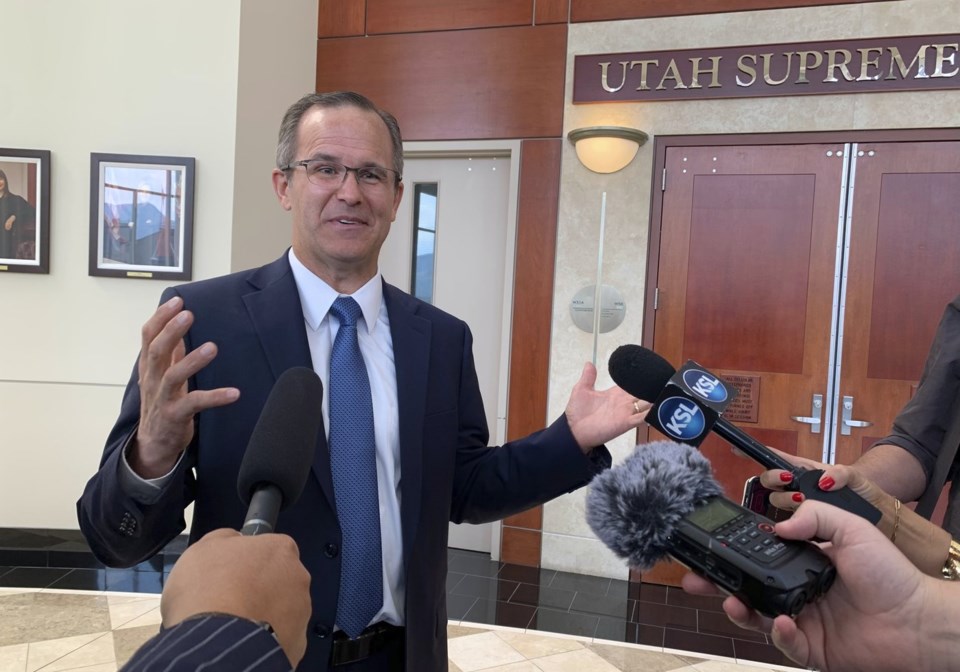SALT LAKE CITY (AP) ŌĆö U.S. Rep. Celeste Maloy narrowly won the Republican primary in Utah's 2nd Congressional District on Tuesday after the state Supreme Court rejected that asked justices to count a batch of ballots with late postmarks after by fewer than 200 votes.
After hearing oral arguments last week, the Utah Supreme Court shot down Colby Jenkins' last-ditch effort to recover enough disqualified ballots to overtake his opponent. The panel determined that Jenkins failed to identify any instance where election officials did not comply with state law, Chief Justice Matthew Durrant wrote in a court order Tuesday. He said Jenkins' lawyers also did not inform the court in their petition that they would be challenging the constitutionality of the state law requiring mailed ballots to be postmarked before Election Day.
ŌĆ£His petition falls well short of establishing that he is entitled to the relief he seeks," Durrant wrote.
Maloy, who is endorsed by former President Donald Trump, led by 176 votes after a recount in early August, which makes her the Republican nominee now that Jenkins has exhausted all avenues to challenge the results. She is seeking her first full term in Congress after last fall.
ŌĆ£I know it was a really close race, and I know that means a lot of people didn't vote for me, so I just want to speak to the people who didn't support me and say, ŌĆśIŌĆÖm going to keep working for you.'ŌĆØ Maloy said in a video statement Tuesday after the court decision. ŌĆ£I'm going to work hard for Utah and for the people of the 2nd District, regardless of where they fell in this primary.ŌĆØ
Maloy's lead after Election Day was narrow enough to put the race within recount territory, which in Utah is when the difference in votes for each candidate is equal to or less than 0.25% of the total number of votes cast.
Jenkins formally requested the recount but followed it up immediately with his legal challenge contesting the certification of results over more than a thousand late ballots. His complaints revolved around a batch of ballots routed through Las Vegas, where some mail from southern Utah is processed.
He called Tuesday ŌĆ£a sad day for democracyŌĆØ and criticized the state for ŌĆ£outsourcingŌĆØ elections to other entities such as the U.S. Postal Service.
ŌĆ£I have contacted Congresswoman Maloy to officially congratulate her on her victory,ŌĆØ Jenkins said in a statement. ŌĆ£We remain committed to ensuring that every citizen's right to vote is protected.ŌĆØ
Maloy's primary victory notches Trump his only win of this election cycle in Utah, a rare Republican stronghold that has not fully embraced his grip on the GOP.
A candidate lost to the more moderate U.S. Rep. John Curtis in the . Many others who aligned themselves with the former president, in Utah and beyond, have lost primaries this year, dealing a blow to TrumpŌĆÖs reputation as a Republican kingmaker.
Maloy is favored to win in November over Democratic nominee Nathaniel Woodward, a family law attorney. The 2nd District, which groups liberal Salt Lake City with conservative St. George and includes many rural western Utah towns, has not been represented by a Democrat since 2013.
The congresswoman rebounded from a loss at this yearŌĆÖs state GOP convention, which typically favors the farthest-right candidates, to ultimately defeat Jenkins at the ballot box. Jenkins, a retired U.S. Army officer and telecommunications specialist, got the nod from delegates after earning the support of UtahŌĆÖs right-wing U.S. Sen. Mike Lee, but he did not win by a wide enough margin to bypass the primary.
The dueling endorsements from state and national leaders of the partyŌĆÖs far-right faction made for a closer than expected contest that could not be called until nearly two months after Election Day.
Maloy, who lives just north of Zion National Park in Cedar City, began her career at the U.S. Department of Agriculture, working to conserve natural resources, improve water quality and manage nutrients in the farmlands of southwest Utah. As an attorney, she specialized in public land issues involving soil and water and land ownership. In her brief congressional tenure, she has served on subcommittees focusing on water resources and rural development.
Hannah Schoenbaum, The Associated Press




